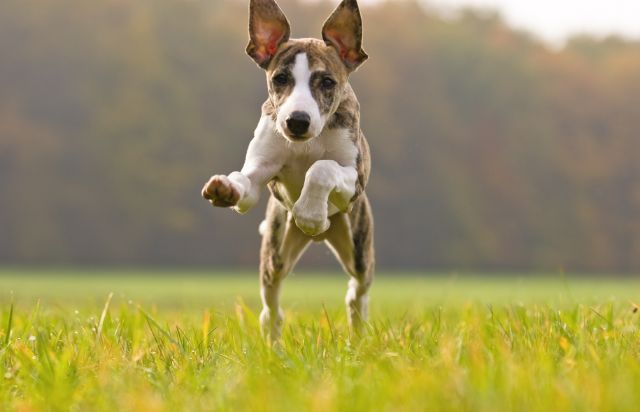Whippets
Showing all 4 results
Shelter Dog Meal Donation Count:
Showing all 4 results
Whippets are adaptable, loving, and smart, perfect for any family or living space. With minimal grooming needs and enjoyment of both exercise and indoor relaxation, they are easy to care for and bring joy and affection into any home, as long as their basic needs are met.
The Whippet is a sighthound breed, initially bred for rabbit hunting and racing. They are known for their incredible speed and agility, as well as their loving and friendly nature. They make excellent family pets due to their gentle demeanor and adaptability.

Originating in England during the late 18th century, Whippets were developed by crossing Greyhounds with smaller terriers, primarily for hunting and dog racing by working-class people. They were recognized as a distinct breed by The Kennel Club (UK) in 1891, showcasing their enduring appeal and distinct characteristics.




Whippets are generally healthy, but like all breeds, they can be susceptible to certain health issues like deafness, eye problems, and heart issues. Regular vet check-ups are important.
Their short coat requires minimal grooming, making them ideal for those looking for a low-maintenance pet. Weekly brushing and occasional baths will keep them clean and healthy.
They require regular exercise to manage their energy levels. Daily walks and the opportunity to run in a secure area are essential.
Whippets are intelligent and learn quickly but can be independent. Consistency and positive reinforcement are key in their training.
A balanced diet suited to their age, size, and activity level is crucial. High-quality dog food, whether commercial or home-prepared with your vet's supervision, is important for their health.
Caring for a Whippet involves understanding their unique needs, from their love for sprinting to their need for companionship and affection. With the right care, Whippets make wonderful, loving pets that fit well into a wide range of lifestyles.
Whippets are generally healthy dogs, but like all breeds, they are prone to certain health conditions. It's important for owners to be aware of these potential issues and to conduct recommended tests to ensure their Whippet's well-being.
Whippet owners need to maintain regular veterinary care and screenings for these conditions. Early detection through these recommended tests can significantly improve the management and prognosis of potential health issues in Whippets, ensuring a healthy, happy life for these swift and affectionate companions.
The iHeartDogs Free Rx Discount Card Program is a pet prescription discount card that can help you save money on your furry friend’s medications. The card is free to sign up for, and you can use it at participating pharmacies nationwide. To use the free program, simply show the card to your pharmacist when you pick up your pet’s prescription. The pharmacist will then scan the card, and you will receive a discount on the price of the medication.LEARN MORE
Caring for a Whippet, like any dog, involves various expenses. The annual cost can vary depending on several factors your location, the quality of products and services you choose, and the specific needs of your dog. Here’s a breakdown of typical expenses involved in caring for a Whippet:
Total Estimated Annual Cost:
$2735 - $5970
It's important to note that these figures are estimates and can vary. Also, the first year of owning a dog can be more expensive due to one-time costs like spaying/neutering, initial vaccinations, and training. Regular budgeting for your dog's needs and an emergency fund for unforeseen costs are essential for responsible pet ownership.